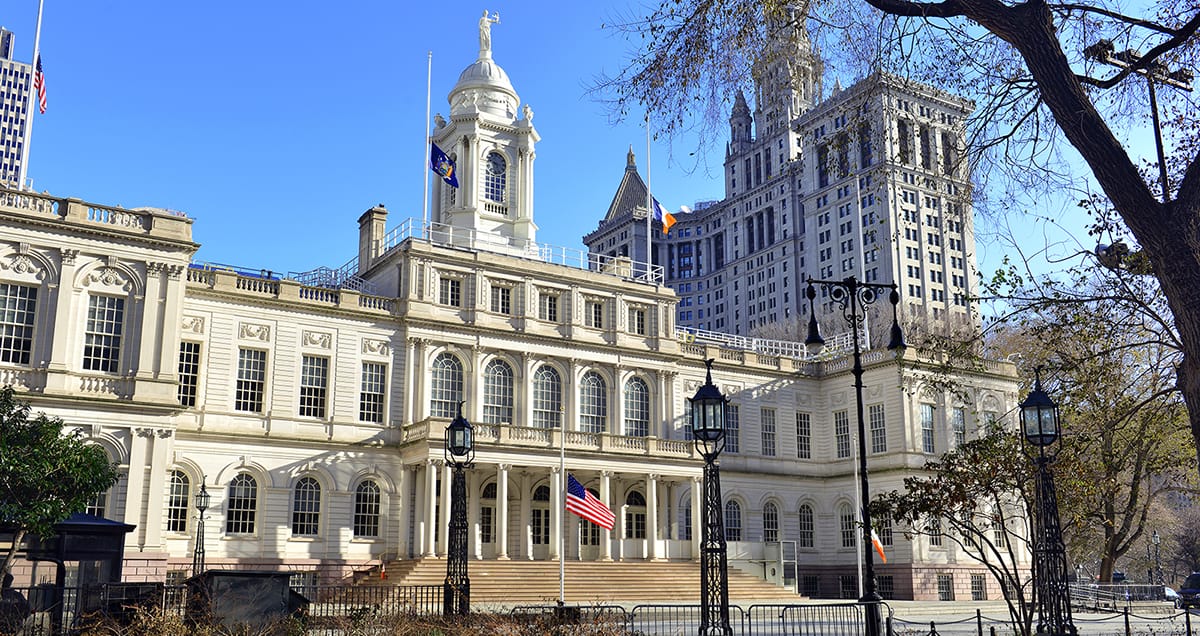Policy
NYC Targets Housing Red Tape With Ballot Measures In Vote Today
By Tuesday evening, New York City voters may know who their next mayor is and whether the city's charter is amended to improve housing affordability.

New York City residents won't know until late evening whether voters approved proposed city charter amendments aimed at addressing the city's long housing affordability problem.
Polls close at 9 p.m. EST. Early indications lean toward a win for housing advocates.
All four housing-related ballot questions polled favorably by wide margins in a recent Morning Consult poll conducted for the Partnership for New York City, a nonprofit organization of corporate, investment, and entrepreneurial firms.
New York City, one of the priciest metros in the world, is now on the cusp of taking steps similar to those in California to ease the path for new housing development and reintroduce "missing middle" housing types. How New Yorkers vote on the measures could serve as a national bellwether for the demand for more housing options.
Developers have long complained about the difficulties of building in the city, particularly restrictive zoning laws and the burdensome bureaucratic regulatory process.
The ballot measures have been a point of contention among city officials. Mayor Eric Adams's charter commission proposed the measures to speed up housing development. However, the City Council attacked Adams, claiming the measures amounted to a power grab that would reduce the Council's ability to negotiate community benefits.
Adams, however, has since dropped out of the mayoral race and endorsed former Gov. Andrew Cuomo, who supports the proposals. Democratic candidate Zohran Mamdani, who leads in the polls, waited until he voted today to reveal his support for the housing questions, the Gothamist reported. Republican candidate Curtis Sliwa opposes the ballot measures.
Several prominent officials have endorsed the measures, including Governor Kathy Hochul, Comptroller Brad Lander, and the borough presidents of Manhattan, Brooklyn, and Queens.
Graham Jones, a managing member of a New York City-based apartment developer, tells The Builders Daily that the ballot measures would be “tremendously” helpful, especially considering the Housing Stability and Tenant Protection Act the city passed in 2019.
The sweeping reform of rent laws expanded rent stabilization, added new tenant protections, and placed stricter limits on rent increases for major capital improvements. Under the law, landlords were required to give tenants at least 30 days' notice if they planned to increase rent by more than 5%.
New York is a city that desperately needs more housing,” Jones says. “There's little to no rental housing that's been that's been built, and the 2019 rent laws greatly hamstrung a building owner's ability to renovate rent-stabilized apartments that they then could get back. Epic disaster.”
While rents are high, sales prices for new residential properties frequently start in the millions.
The election is poised for a record turnout. More than 735,000 people voted early, according to the Board of Elections in the City of New York. While the mayoral candidates spent the weekend making their final pitches, housing advocates did the same for the ballot measures.
Do you think it’s fair that the wealthiest and most well-connected neighborhoods in the city are the ones that build the least amount of new housing?” Jess Coleman, a Lower Manhattan resident, attorney, and community advocate, said on social media, asking voters to favor the ballot measures.
Polling on Key Housing Ballot Questions
The Morning Consult poll surveyed 581 registered voters in New York City and has a margin of error of plus or minus 4 percentage points. The results show broad support across three main proposals:
- Question 2: Fast Track Affordable Housing: This proposal would streamline the approval process for city-funded affordable housing projects and for developments in neighborhoods that have produced the least affordable housing.
- 70% of NYC voters support this measure.
- 13% are in opposition.
- 17% are undecided.
- Question 3: Simplify Review for Smaller Projects: This measure aims to simplify the land use review process for modest housing additions and minor infrastructure projects.
- 67% of voters are in favor.
- 15% oppose the measure.
- 18% remain undecided.
- Question 4: Establish an Affordable Housing Appeals Board: This would create a board with representatives from the City Council Speaker, the local Borough President, and the Mayor to review affordable housing applications that the City Council has rejected or altered.
- 66% of voters support the creation of this board.
- 16% are in opposition.
- 18% are undecided.
As New Yorkers head to the polls, these ballot measures represent a potential turning point in the city's approach to its intractable housing crisis. With strong public support and backing from key state officials, the proposals aim to dismantle long-standing bureaucratic hurdles that have stifled development.
The outcome will not only shape the next mayor's housing agenda but also signal whether one of the world's most complex real estate markets is ready to embrace reforms designed to create more homes for its residents.
MORE IN Policy
Wisconsin’s Housing Progress Faces A Bipartisan Breakdown
After a rare bipartisan win in 2023, Wisconsin lawmakers are back with a new round of housing reform. But political divisions are slowing momentum on proposals aimed at easing affordability and expanding middle-market housing supply.
Arkansas ADU Law Sets Fast-Approaching Housing Deadline
Arkansas’s bold new housing law gives cities until January 1 to legalize accessory dwelling units statewide. The move could reshape how local zoning and housing affordability intersect across one of America’s fastest-growing regions.
Dallas Rewrites Its Zoning Legacy to Fix Housing Shortage
After decades of single-family dominance, Dallas is embracing density again. A landmark ordinance revives small-scale housing once zoned out of existence — and signals a turning point for Texas growth policy.
